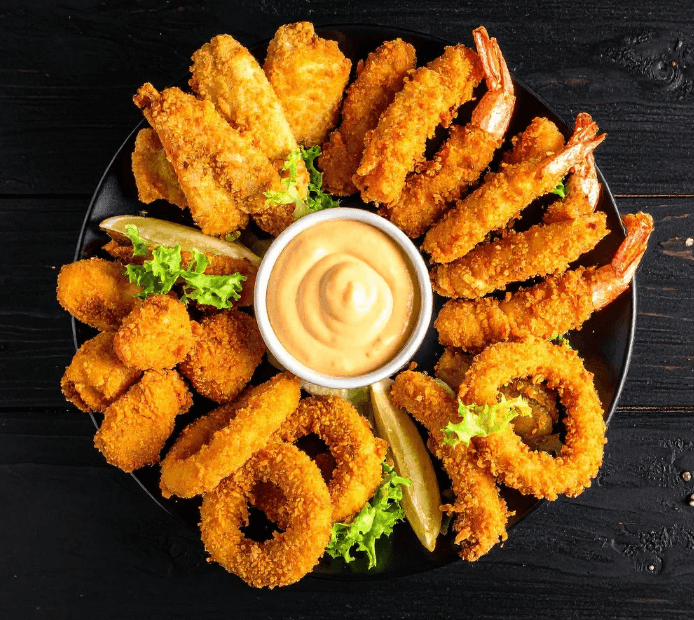Fried Foods
Fried foods can be harmful to pets due to their high fat, calorie, and sodium content. Even small amounts can cause digestive problems or serious health risks.

The level of risk depends on the ingredients used, but fried foods like fried shrimp or fish cakes can be particularly harmful and should be avoided. Additionally, the batter and coating used to make fried foods can also negatively impact your pet’s health.
Why Fried Foods Are Harmful
- High Fat and Calories: Fried foods are cooked in oil, making them extremely high in fat and calories. Pets that regularly eat high-calorie foods are at increased risk of obesity and other related health problems.
- Digestive Issues: Fried foods are difficult for pets to digest. Because dogs and cats have more sensitive digestive systems than humans, they are more likely to suffer from indigestion, vomiting, or diarrhea after eating them.
- Nutritional Deficiency: Fried foods lack essential nutrients. Pets require a balanced diet, and nutrient-deficient foods can cause long-term health issues.
Diseases Caused by High-Fat Foods
Consuming high-fat foods can lead to pancreatitis, a potentially serious condition. The pancreas releases digestive enzymes, but excessive fat intake can cause the pancreas to overproduce these enzymes, triggering inflammation. If inflammation occurs repeatedly, chronic pancreatitis may develop.
Symptoms of Pancreatitis
- Loss of appetite: Eating very little or refusing food entirely.
- Vomiting: Persistent or frequent vomiting.
- Diarrhea: Loose or watery stools.
- Abdominal pain: Swelling or discomfort in the stomach.
- Dehydration: Signs of dehydration due to fluid loss.
- Shock: Severe cases may lead to shock, which is life-threatening.
What to Do If Your Pet Eats Fried Food
- Check the Amount: If only a small amount was eaten, there’s usually no need to worry. However, if your pet consumed a large amount, visit a veterinarian immediately.
- Record the Time: Take note of when the fried food was eaten. If symptoms appear later, this information will help your veterinarian provide better treatment.
- Emergency Treatment: If vomiting or diarrhea occurs, digestive enzyme medications may be needed to help the body process the food. Veterinary care is strongly recommended.
- Hydration: Fried foods often contain high levels of salt, so make sure your pet drinks enough water to stay hydrated.
- Diet Adjustment: After eating fried food, avoid giving your pet any more high-fat or high-calorie foods. Provide a light, balanced diet to help recovery.
⚠️ Even if your pet seems fine, fried foods often contain sodium, fat, and calories that can be harmful. Whenever possible, avoid feeding fried foods entirely.
What Happens If Your Pet Eats Too Many High-Calorie Foods?
Overeating high-calorie foods can cause a variety of health problems. Maintaining a balanced diet and appropriate portion sizes is essential.
- Weight Gain: Eating too many high-calorie foods can lead to obesity.
- Obesity: Chronic overeating contributes to long-term obesity, which can shorten your pet’s lifespan.
- High Blood Sugar: High-calorie foods can raise blood sugar levels and increase the risk of diabetes.
- High Blood Pressure: Foods high in fat and sodium can contribute to hypertension.
- Digestive Issues: Overeating puts stress on the digestive system, causing indigestion and discomfort.
Summary
Fried foods are unhealthy for pets due to their high fat, calorie, and sodium content. Even small amounts can lead to digestive problems, and frequent consumption can cause serious diseases like pancreatitis, obesity, or diabetes. Always monitor your pet closely if they accidentally eat fried food, and consult a veterinarian if any symptoms appear.